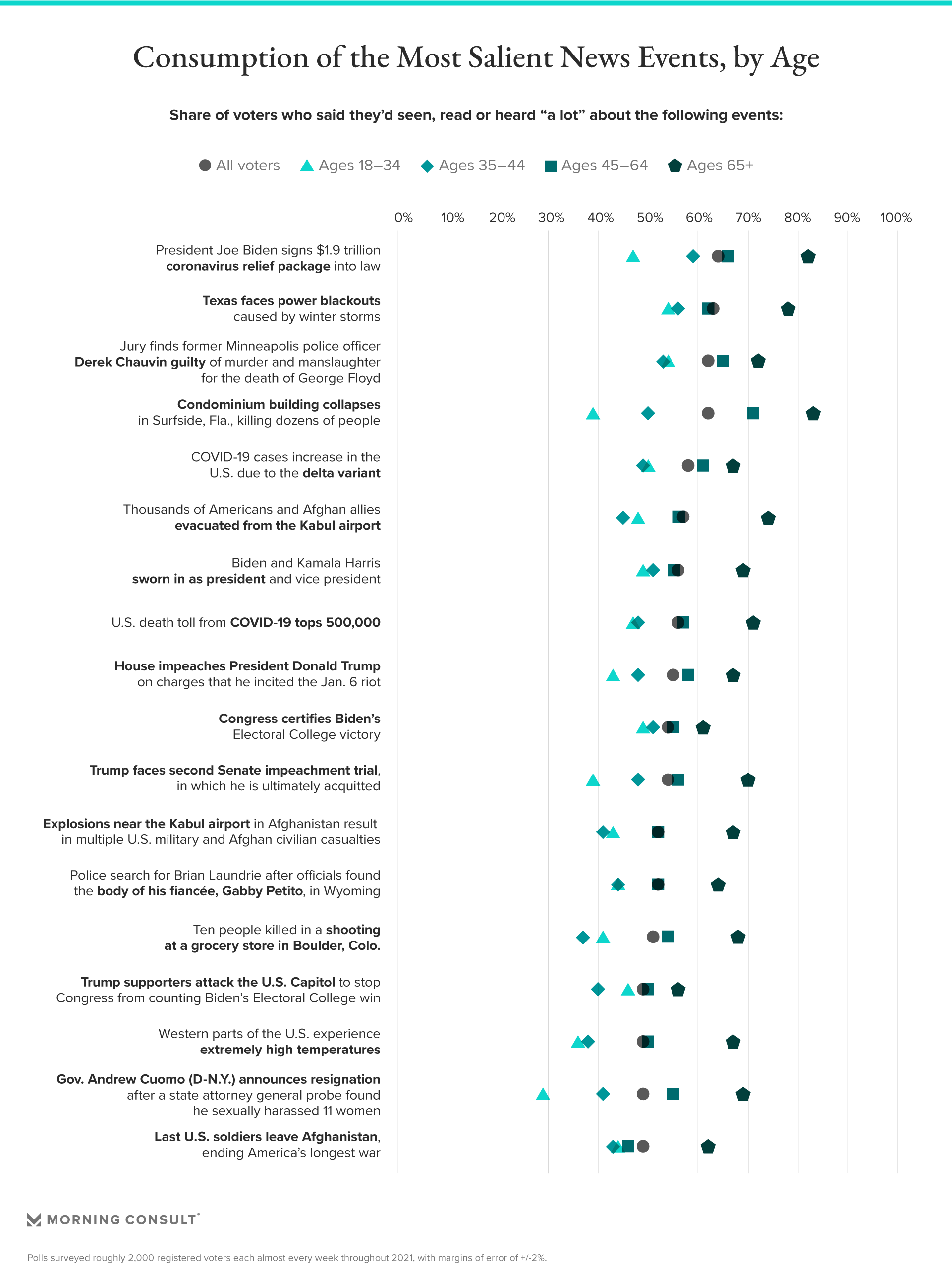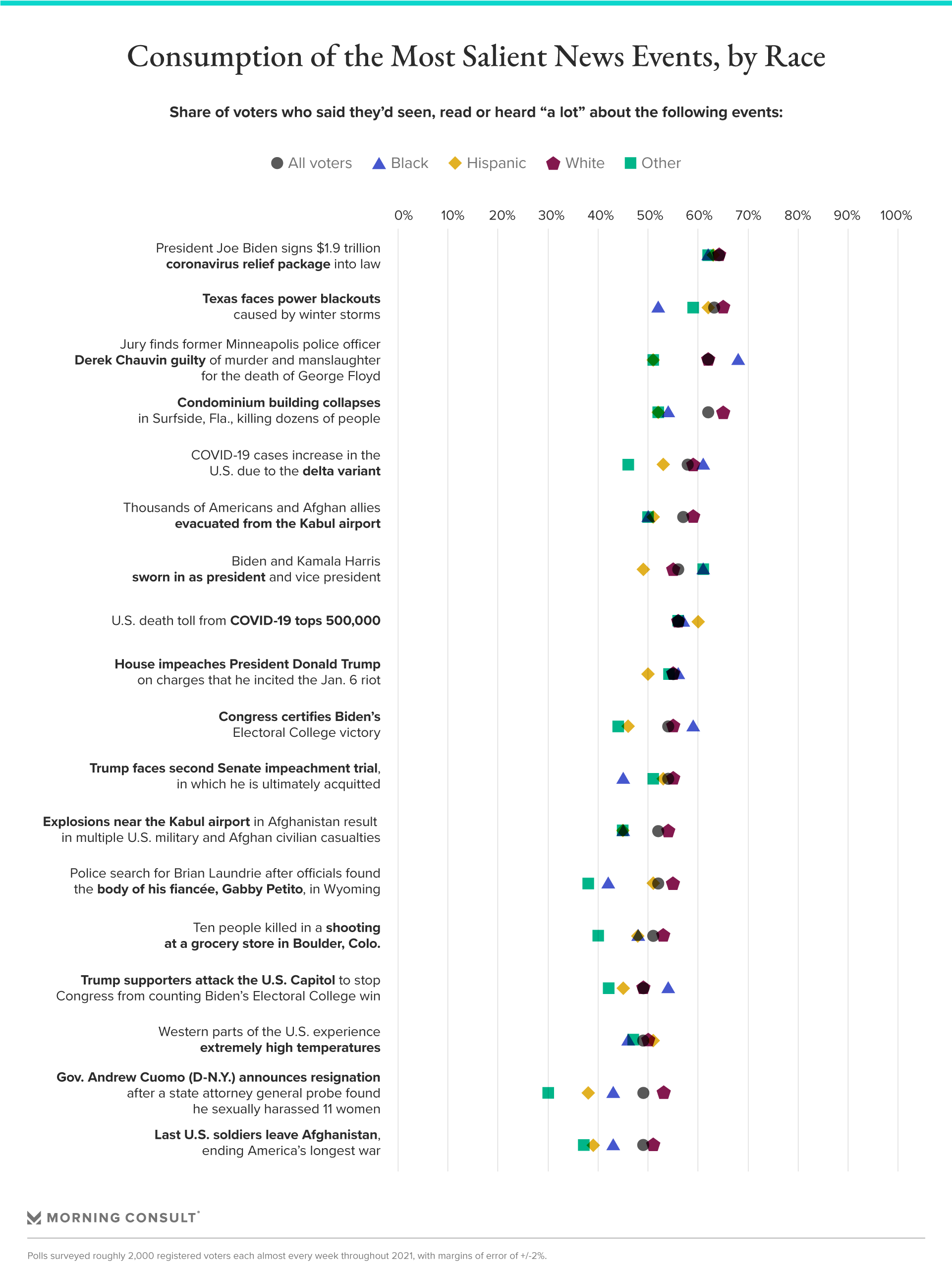Analyze the news that broke in 2021
[ad_1]
Many Americans were poised to move on from death and division into 2020 as they heralded the dawn of 2021, with COVID-19 vaccines making their way into arms and a new president ready to move into the White House . But last year’s events were not over with America, as voters continued to deal with the fallout from the presidential election – starting with the Jan.6 attack on Capitol Hill – a resilient virus and deadly, and the tragic events that sparked nationwide and global protests against Race Justice.
The extent to which these stories were consumed by voters was often determined by the same fissures in partisanship, age and race that permeate American society and its politics, according to the results of 52 Morning Consult surveys conducted throughout. 2021, which asked Americans how much they had seen, read, or heard about a series of current events unfolding at the time. (See the full interactive here.)
Polls conducted throughout the year polled more than 100,000 registered voters on more than 350 current events, ranging from the aftermath of the Capitol Riot to the arrival of the omicron variant in the United States. This report seeks to analyze the news that really resonated across the country by focusing on the share of voters who at the time said they heard “a lot†on an organized list of 131 items to measure importance among the electorate.
The most popular news
Voters were most likely to have heard of President Joe Biden’s signing of his signing legislation so far: the $ 1.9 trillion US bailout, his coronavirus relief bill , which allowed stimulus payments of $ 1,400 for many Americans, among its many provisions.
Almost immediately after its enactment in March, 64% of voters – including 73% Democrats and almost 3 in 5 Republicans and Independents – said they had heard a lot about the signing of the bill, which helped boost Biden’s position with the public at the end of his first 100 days in office.
The deadly winter power outages in Texas, the conviction of former Minneapolis Police Officer Derek Chauvin of the 2020 George Floyd murder and the catastrophic collapse of a condominium in Surfside, Fla. also resonated a lot.
The evacuation of thousands of Americans and Afghan allies from Kabul airport was also a huge event, reaching 57% of voters (without a partisan gap) at the height of the foreign chaos that took hold. helped push perceptions of Biden’s job performance underwater in August.
Partisan consumption gaps
When it comes to traditional political reporting, Republicans were generally less likely than Democrats to report high news consumption, especially when such reporting had negative implications for the party or its leader. For example, Republicans were half as likely to say they had heard a lot about a recording revealing then-President Donald Trump pressuring Brad Raffensperger, Georgia’s Secretary of State, to undo Biden’s victory.
By more than 20 percentage points, Democrats were more likely than GOP voters to have heard much about Georgia Republicans passing restrictive election law in response to Trump’s unfounded electoral fraud allegations, as well as the certification by Congress of the victory of the Electoral College of Biden in stride. of the attack on the Capitol on January 6.
Democrats continue to listen more to major news events than Republicans
Share of voters who declared having seen, read or heard “a lot†about the following:
Polls polled around 2,000 registered voters almost every week throughout 2021, with margins of error of +/- 2%.
News of the attack on Capitol Hill itself has penetrated the minds of around half of voters, according to a poll released the night of the insurgency, producing an equally stark partisan gap of 18 points between Democrats and Democrats. Republicans, 60-42%. .
There were exceptions to the trend: One of the few stories that produced asymmetric partisan resonance was the rise in gas prices. When Morning Consult tested it in March, GOP voters were 20 points more likely than Democrats to say they had heard “a lot†of this inflation warning sign.
While conservative news sources were quick to point out the pain at the pump, the propensity of Democratic voters to learn more about the bulk of mainstream news events that Morning Consult tested could also be explained by where – and how often – these Americans usually hear from them.
According to a Morning Consult survey conducted in May, 41 percent of Democratic voters said they watched daily news broadcasts, compared to 22 percent of Republicans. Democrats were also more likely to report reading a newspaper (22% to 12%) or watching the news on cable (32% to 22%) every day.
Republicans were the most likely to report checking social media information regularly, although they were even less likely to do so than Democrats (27% to 39%).
Generational consumption gaps
While Democrats were, on average, 7 points more likely than Republicans to report hearing a lot about a given news event, the oldest voters – those 65 and over – were 15 points more likely than the younger – those aged 18 to 18. 34 – to report the same.
In addition to the partisan gaps, the survey assessing the nature of Americans’ news consumption found that older voters are more likely than younger to read the newspaper every day (27% to 10%) or tune in to a network newscast daily (46% to 17%), while younger voters are more likely to report finding news each day through social media (45% to 15%).

These disparities were confirmed in the conclusions of this year. Only 47% of the youngest voters, for example, heard a lot about the promulgation of the US bailout, compared to 82% of the oldest voters. And despite the generally high rate of the younger cohort concern for the climate, older voters were much more likely to have heard a lot about the western summer heat wave (67% to 36%) and the impact of Hurricane Ida (64% to 37%) – two stories that caught the attention of the TV news.
Among the few relatively high-profile stories that reached younger voters more were those involving young celebrities, including rapper Travis Scott’s murderous influx of crowds at Astroworld (45% to 39%) and rapper Nicki’s tweet Minaj on COVID- 19 vaccine concerns (26% to 20%).
How the news resonates by race
There were only small variations in the proportions of black and white voters who reported getting their news from mainstream sources such as newspapers, radio, or cable and network news. In turn, there were few racial disparities among the most significant events of the year, from the stimulus bill to the emergence of the Delta variant.

But divisions in news consumption emerged on stories with varying implications for the two groups. Black voters were more likely than white voters (52% to 28%) to report hearing a lot about the guilty verdicts against Travis McMichael, Gregory McMichael and William Bryan for the murder of Ahmaud Arbery. At 68%, black voters were the most likely to have heard of the Chauvin verdict, although 62% of white voters also said the same.
What did not pierce
A number of stories with significant implications in Washington and on the world front were little more than a blip on voters’ radar screens.
Asked about Trump’s April call for the ousting of Senate Minority Leader Mitch McConnell (R-Ky.) – something that could weigh on the handful of contested Republican primaries in 2022 midterm – 45% of voters said they had heard “nothing about it.
The least significant news of 2021
Share of voters who said they had seen, read or heard “nothing at all†on the following:
Polls polled around 2,000 registered voters almost every week throughout 2021, with margins of error of +/- 2%.
A large portion of voters (36%) – including 45% Republicans – said they had heard nothing of the conclusion of the Republican-led election audit in Maricopa County, Ariz., Which reaffirmed Biden’s 2020 victory over Trump and provided even more proof that the Democrat won fair and square.
Agreements with significant geopolitical implications, such as the US-German agreement to enable the completion of the Nord Stream 2 gas pipeline with Russia or the so-called AUKUS nuclear submarine pact between the United States, the United Kingdom United and Australia, which angered France, were also among the agreements of 2021. the less significant news.
But serious stories weren’t the only ones that failed to reach voters. Remember when Washington was briefly obsessed with the way Biden’s dog, Major, bit someone in the White House? It was also one of the least resonant stories with voters, with 29% saying they hadn’t heard anything about it.
[ad_2]


Comments are closed.